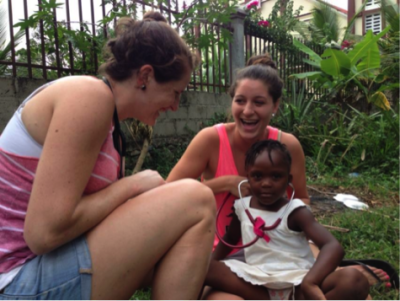SAVMA's Underserved Areas Stipend in Action
 Thursday, July 18, 2013 at 11:22AM
Thursday, July 18, 2013 at 11:22AM SAVMA's Public Health and Community Outreach Committee offers eight awards of $500 each year to help veterinary students on externships in underserved areas. Applications are accepted on a rolling basis and can be found here. Read on for how Alison Morgera from Penn spent her time in Haiti.
As a member of the Pou Sante: Amar Haiti team, I recently traveled to Thibeau, Haiti, to demonstrate the importance of the veterinary profession in all aspects of human, animal, and environmental health.  Showing little Rood how to listen to the “ka” (heart)It is Pou Sante’s mission to establish a long-lasting partnership with the main goat farmers of Thibeau. Our goal is to provide these farmers with the knowledge necessary to maximize animal agriculture and empower them to become animal health leaders within their community. Through this cooperative, we then hope to implement sustainable farming practices for the future in order to improve both human and animal health alike.
Showing little Rood how to listen to the “ka” (heart)It is Pou Sante’s mission to establish a long-lasting partnership with the main goat farmers of Thibeau. Our goal is to provide these farmers with the knowledge necessary to maximize animal agriculture and empower them to become animal health leaders within their community. Through this cooperative, we then hope to implement sustainable farming practices for the future in order to improve both human and animal health alike.
The small, rural community of Thibeau lies within one of the most impoverished countries in the world. Haiti is a place where jobs are at a premium and farming is the sole source of livelihood for many of its inhabitants. Its animals are a fundamental source of nutrition and trade and as such, play an integral role in human survival. In such a society, where animals are an exclusive source of nutrition and yet veterinary care is scarce, there is an overwhelming need for public health education and sustainable farming practices. Our two weeks in Thibeau proved to be just the first step in what hopefully will be an extended partnership between PennVet and the people of Haiti.
“We had a cat, but we ate it.” This was the reply I received when I polled a group of Haitian children about what types of animals they owned.
 Haiti,
Haiti,  International Veterinary Outreach,
International Veterinary Outreach,  PHCOC in
PHCOC in  Scholarships
Scholarships 